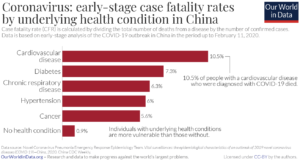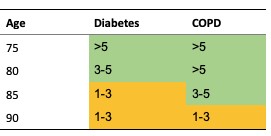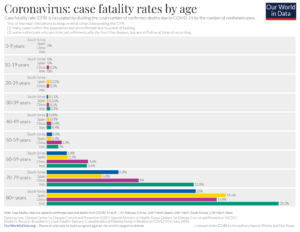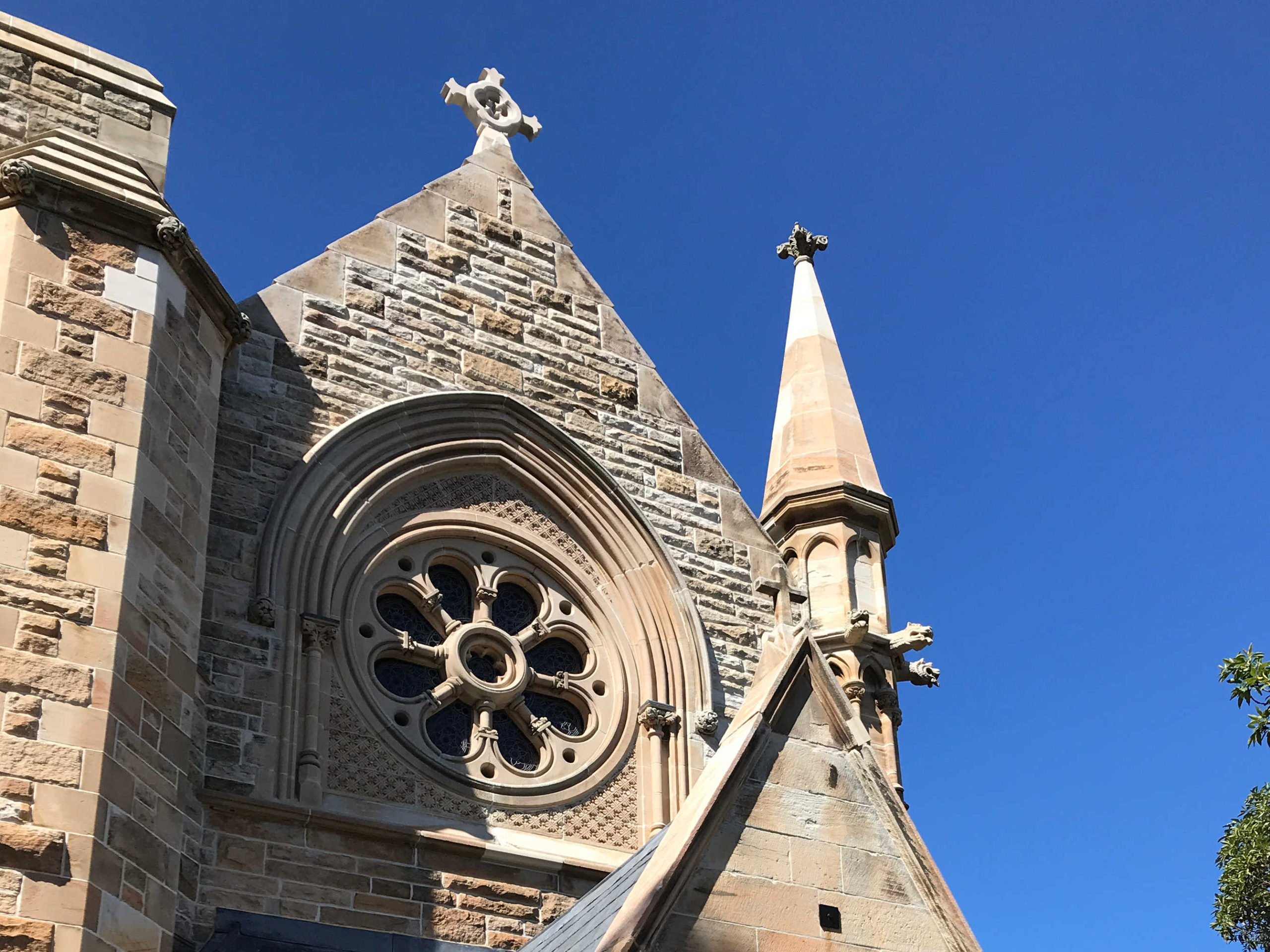Insight
Covid19’s death rates are higher at higher ages. In all the outbreaks so far, the case fatality rate for people over 80 is well over 10% (there’s a table below with more detail). Some of the commentary urging early reopening from lockdown implicitly suggests that those people will die soon anyway, so we shouldn’t be too concerned about those death rates. Below I’ve set out why I disagree.
An article in the Australian Financial Review last week is typical of this kind of thinking.
The Prime Minister has flagged strict restrictions are likely to last at least six months.
That is too long to wait for many “quiet Australians”. Public frustration is already building on infringements against civil liberties such as going to the park, a long car drive, fishing and playing golf in open space.
The coronavirus overwhelmingly kills older people.
Is a person who has lived into their late 70s, 80s or 90s owed the same priority to preserve life as a person in their 20s or 30s who typically has more than 50 years still to live?
I want to look at how many years of life those 80 year olds might expect. In Australia, an 80 year old man has a life expectancy of 9 years – in other words on average (technically this is a median, sorry to the statisticians), today’s 80 year old will die aged 89 in 2029. I can’t imagine most 80 year olds of my acquaintance happily giving up those 9 years so that I can go out and play golf.
But wait, some might say, people who are living with other diseases are more likely to die of Covid19, as they are unhealthy, so they aren’t going to live the full 9 years. Here’s a graph showing this from early statistics in China.

Of course the analysis above is not corrected for age. The average 80 year old is more likely to have one of the conditions leading to higher death rates than the average 20 year old. So this might just be another way of saying that older people are more likely to die of this disease. But even presupposing that we have someone aged 80, with diabetes, or a chronic respiratory disease, for example, an insightful group of actuaries have pointed out that there are quite a lot of years being taken away even from those people who start out reasonably sick. The table below shows that even for quite old people with quite serious illness (Diabetes or Chronic Obstructive Pulmonary Disease) their life expectancy before Covid19 is at least one year, and often quite a lot more.

…a life expectancy below a couple of years can be found only by assuming acute cancers, or other serious but less critical conditions at ages above 90, or such conditions conjoined with adverse risk factors (e.g. smoking) from the mid-80s.
For anything else, life expectancy is typically five years or more. For instance, the table below shows the life expectancy for obese male smokers for various combinations of age and disease. COPD (Chronic Obstructive Pulmonary Disease) is of particular interest in the context of a virus that kills through a pneumonia-like mechanism causing respiratory failure.

For the thinking in this piece, I am indebted to the group I’ve linked to above – particularly Stuart McDonald, whose tweet thread a week ago analysed a number of different sources.
Link
This link, from Wired magazine, takes as its premise that the general population will take Covid19 more seriously once they know someone who has died from it.
Pew also finds that almost 80 percent of Fox News viewers think the media has exaggerated the threat of the virus (we haven’t) and 7 percent of people aren’t really following the news about it at all. Even President Trump seems to think that only people who “sadly lost a family member or friend” will even remember Covid-19 when it’s all over. These numbers are fast-changing, but still, watching the pandemic unfold as news from a distant city or as lines and numbers on charts might be very different than being in a hotspot, or knowing someone who dies from the disease.
So they look at how many people have to die before every American knows one of the dead. It’s a great article about the mathematics of networks, but ultimately it doesn’t reach a conclusion, it just explains how hard it is to model networks with variable levels of connection between members, and how many surprising uncertainties there are in each assumption you make. You have to read the article to understand the jargon in the mathematician’s conclusion. The answer is clearly harder than the simplicity of the question.
“We have an unknown diffusion process, on an unknown network structure, and we have a problem whose simplified version would be NP-complete. We have both theoretical-algorithmic obstacles and serious lack of data,” Fotouhi says. “I don’t think any estimate would be reasonable—even crude approximations.”
As a non american, I found the unwritten assumption in this article that Americans only know other Americans annoyingly parochial. So far one of the two people I know who has been very sick with Covid19 has been an American I met 10 years ago (he’s fit and in his early fifties, which made all those hospitalisation statistics I’ve been reading much more impactful to me). After a few very scary days in hospital, he’s home now on oxygen. But I think beyond the parochialism the Wired article misses the point a little bit about emotional connections. The sad progression of famous people who are dying of this disease means a two way relationship isn’t necessary for emotional impact.
I’ve never met Tim Brooke-Taylor. But waking up to the news that he died of Covid19 yesterday still had a profound impact on me, and so many other Gen-Xers. It brought the tragedy of this disease home more than the heartbreaking pictures and stories of strangers has done. The Goodies were part of my childhood, as they were for so many people my age, particularly here in Australia, where they were repeated for many years more than they were in their home in the UK. I’d like to think I was taking this seriously before that emotional connection. But the emotional connection can come in surprising places.
Life Glimpses
Someone I follow on twitter grumpily complained yesterday about all the people baking when there is perfectly good, in fact excellent, bread available for sale at bakeries all over town. I’m one of the many who has taken to baking bread during this quarantine period. And my bread is not nearly as reliably excellent as the bread we can buy within 5 minutes walk every day.
But I’m still finding the process of baking bread or something else every few days very comforting. I’ve always been a recreational baker – most weekends I try and make an interesting dessert – and even though it only works well about half the time, it is very satisfying when it does.
My baking is never going to be as good as a well designed industrial process. But the joy comes in the making, as much as the eating.
Bit of Beauty
Even though I’m not a believer, I was brought up Anglican. And I do love the rituals and beauty of religion. Today’s bit of beauty comes from one of our local sandstone churches – St Thomas’ Anglican church. It was designed by Edmund Blacket (also the architect of some much more famous sandstone buildings in Sydney, such as St Andrew’s Cathedral), and was recently cleaned to a perfection that seems almost designed for an Australian deep blue sky.


Trivia. Edmund Blacket’s son Cyril won a competition for the design of the hospital at Wilcannia. Lovely sandstone singly story building.
My huskand’s take on the article, which i read, was that the journalist was just after his fathers estate! His thinking was a bit linear. I think there would be many consequences unforeseen by the journalist to both society and the economy using his approach.
The other things missed by the AFR’s careless editorial:
1. A large number of younger people also have co-morbidities, especially asthma (in Australia)
2. A fatality rate of 0.2% still results in a large number of deaths, if millions of people are infected. And the fatality rate goes up if there is limited access to specialist care
As usual I will not comment on reflections No.20. As to life glimpses, I think cooking and baking can be creative and very satisfying for the one who does it, and for those who eat it.
St. Thomas looks lovely, I do remember the church. Love Marta